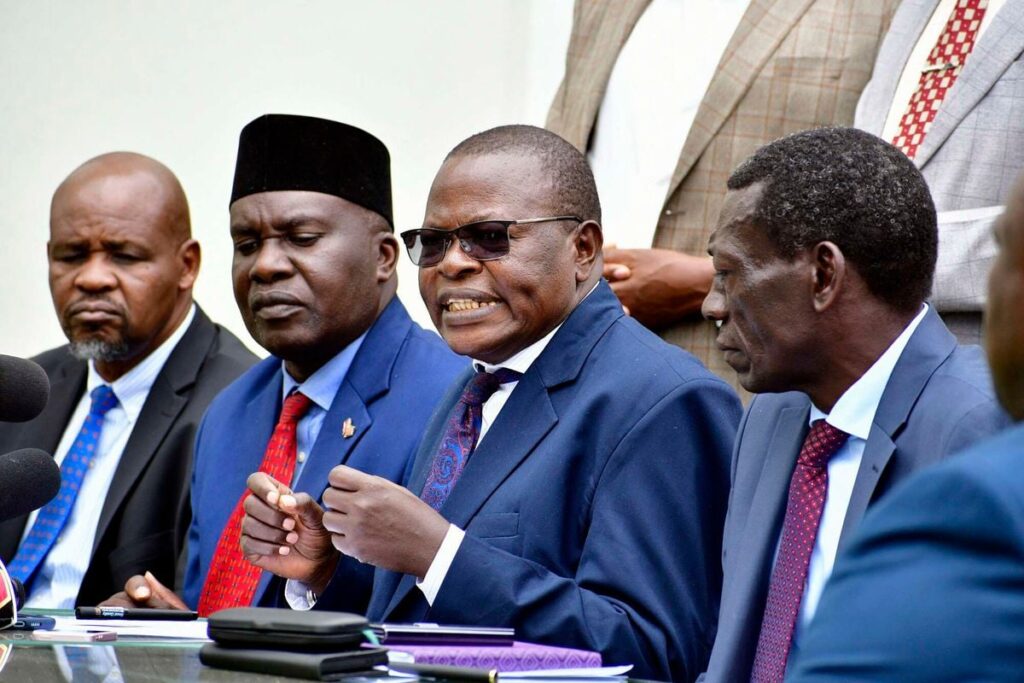Nancy Macharia: 10-Year Reign at TSC – Legacy and Controversy.
As Nancy Macharia concludes her decade-long leadership at the Teachers Service Commission (TSC), she reflects on the journey with pride, despite controversies clouding her achievements.
In her final edition of Image, the TSC’s biennial publication, she described her time as CEO as both a privilege and a significant period of transformation. She claimed satisfaction in the milestones reached, saying that leading the commission had been an extraordinary responsibility and a team effort filled with progress.
Throughout her tenure, Ms Macharia oversaw the registration of 229,410 trained teachers and expanded the teacher establishment from 311,665 in 2015 to 413,653 in 2025. She spearheaded programmes such as the Teachers Induction Mentorship and Coaching Programme (TIMEC), the Teacher Professional Development (TPD), performance contracts, and appraisals, aimed at improving professionalism and accountability in the teaching service.
Additionally, she noted that 229,000 primary school teachers and 55,125 junior school teachers (91.7% of the targeted group) were retooled to implement the Competency-Based Curriculum (CBC). In a bid to enhance teachers’ capacity, she reported that 56,519 educators, along with 1,712 field officers, 28,741 Boards of Management members, and 38,354 school heads, were sensitised on effective teacher conduct management.
Labour Relations and Union Disputes
Macharia’s administration, however, was fraught with strained industrial relations. Her tenure was marked by disputes with the Kenya National Union of Teachers (Knut) and the Kenya Union of Post Primary Education Teachers (Kuppet).
Critics accused her of starving unions of membership fees, thereby coercing leaders into ending strikes. Despite these criticisms, she insisted that there was industrial harmony under her leadership.
The controversy surrounding the promotion of 25,000 teachers further dented her legacy. Many accused the commission of favouritism and disregarding fair processes. Moreover, the decision to place 46,000 junior school teachers under Kuppet, a move contested by Knut, stirred tensions.
Collins Oyuu, Knut’s secretary-general, maintained that legal procedures were not followed, arguing that no membership forms had been signed by the affected teachers.

Unresolved Promotion Challenges
Macharia acknowledged that teacher stagnation remained unresolved. She disclosed that 66,828 teachers had remained in the same job group for up to eight years, with another 102,768 stuck for three to five years.
A total of 178,881 promotion cases were pending, despite 151,611 teachers having been promoted in the last three years. She attributed the stagnation to insufficient budgetary allocations, stating that TSC needed Sh35.4 billion to address the backlog.
Career Progression and Appraisal Controversy
One of the most contested aspects of her leadership was the introduction of Career Progression Guidelines (CPGs), which replaced automatic promotions based on academic qualifications.
Many teachers, who had pursued further education with promotion hopes, found themselves disappointed. Macharia defended the shift, explaining that TSC implemented the Teacher Performance Appraisal and Development (TPAD) tool to assess teachers through a more structured and competency-based framework.
Deployed in 2016, TPAD was enforced across all levels of education, with school heads tasked with oversight in line with the Code of Regulations for Teachers (2015).
Decentralisation and Infrastructure Expansion
Under her leadership, TSC decentralised its operations significantly. The commission set up 394 sub-county offices and built regional offices in Bomet, Kilifi, and Machakos, with additional constructions planned in Kwale, Murang’a, and Kitui.
She highlighted that services such as recruitment, promotion, registration, and transfers were fully decentralised and digitised, marking a major operational shift. She also cited the rollout of Remote Learning Methodologies and further automation of records as future-focused initiatives.
Politicisation and Alleged Corruption
Yet, her final days at TSC were not without scandal. Allegations emerged that politicians had been given TSC employment letters, bypassing normal recruitment protocols.
Murang’a Woman Representative Betty Njeri disclosed that these letters were distributed at State House before a presidential tour of the Mt. Kenya region. A lawyer and lecturer, Mr Kipkirui Kap Telwa, said that employment and promotions had been taken over by cartels and political operatives, describing it as a corrupt, transactional scheme within TSC and political circles.
Read Also: KNUT wants TSC to Stop Relying on KCSE Grades to Hire Teachers
He alleged that teacher appointments were no longer based on merit but were influenced by money and loyalty. He said that TSC, alongside political actors, had created a “well-oiled corruption scheme” that disadvantaged qualified but unconnected candidates.
Conclusion
As her tenure ends, Nancy Macharia asserted that she leaves behind a robust and well-structured commission capable of managing resources down to the zonal level. While she acknowledged the challenges and criticisms faced, she believed her contributions had laid a strong foundation for the future.
“This role was never easy, but I gave it my all,” she said. “There were difficult days, but the goal was always the same—improve education for our children.”

Follow Teachers Updates on Facebook, LinkedIn, X (Twitter), WhatsApp, Telegram, and Instagram. Get in touch with our editors at [email protected].


Discussion about this post